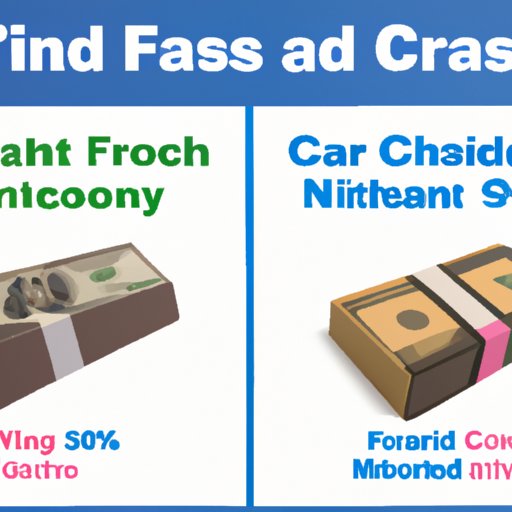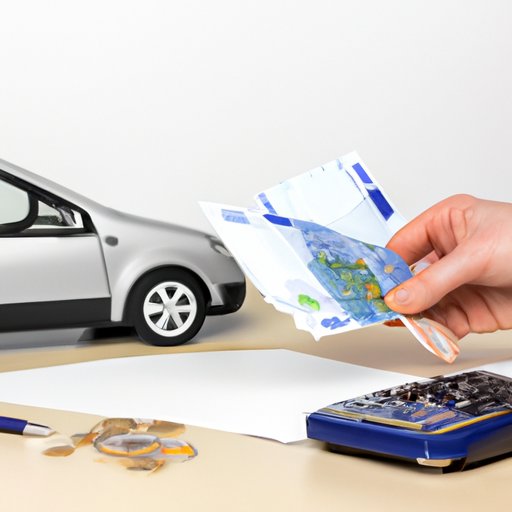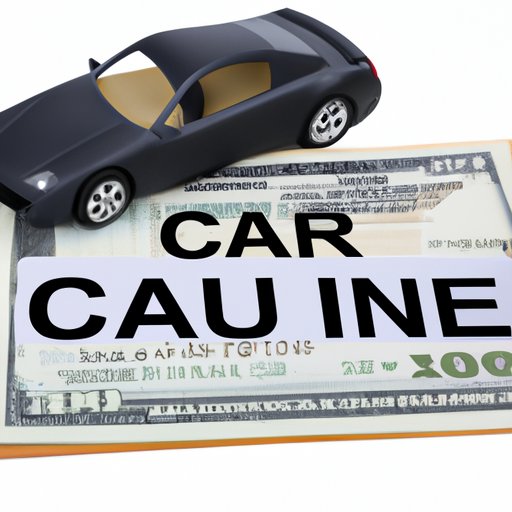Introduction
Buying a car is a major financial decision. Whether you’re purchasing a new vehicle or a used one, you’ll need to decide whether to pay cash or finance your purchase. Both options have their own unique advantages and disadvantages, and understanding them can help you make an informed decision about which option is best for you.
Analyzing the Pros and Cons of Paying Cash for a Car
Paying cash for a car is one of the simplest ways to buy a vehicle. There are no loan documents to sign and no monthly payments to keep up with. However, there are some drawbacks to this option as well.
Advantages of Paying Cash
One of the main advantages of paying cash for a car is that you don’t have to worry about making loan payments each month. This means you’ll be able to save money in the long run since you won’t have to pay interest on the loan. Additionally, paying cash may give you more bargaining power when negotiating the purchase price of the vehicle.
Disadvantages of Paying Cash
The biggest disadvantage of paying cash for a car is that it requires you to have a large amount of money upfront. This can be difficult for many people who don’t have the savings to cover the entire cost of a car. Additionally, if you do choose to pay cash, you won’t be able to build any credit history from the purchase.
Exploring the Benefits of Financing a Vehicle Purchase
Financing a car purchase can be a great option for many people because it allows them to spread out the cost of the car over several months or years. This can make the purchase more affordable and allow them to better manage their finances. There are also other benefits to financing a car purchase.
Lower Upfront Costs
One of the biggest advantages of financing a car purchase is that it allows you to pay lower upfront costs. When you finance a car, you only have to put down a small amount of money upfront, usually 10-20 percent of the total cost of the car. This can make the purchase much more manageable and allow you to get the car you want without having to pay a large sum of money upfront.
Ability to Build Credit History
Another benefit of financing a car purchase is that it gives you the opportunity to build a positive credit history. When you make your loan payments on time each month, it will help to improve your credit score. This can open the door to other opportunities such as getting a better interest rate on future loans.
Potentially Lower Interest Rates
When you finance a car purchase, you may be able to secure a lower interest rate than if you were to pay cash. This is because lenders view financing as less risky than paying cash. Additionally, if you have good credit, you may be able to qualify for an even lower interest rate, which can reduce the overall cost of the car.

Comparing the Impact of Paying Cash vs. Financing on Credit Scores
When deciding whether to pay cash or finance a car purchase, it’s important to consider how it will affect your credit score. Both options can have an impact on your credit score, but in different ways.
Paying Cash and Credit Scores
Paying cash for a car does not directly affect your credit score. However, if you have a limited credit history and no other open lines of credit, it may be difficult to build a strong credit score. This is because creditors need to see evidence that you can responsibly manage debt in order to determine your creditworthiness.
Financing and Credit Scores
When you finance a car purchase, it can have a positive effect on your credit score. Making timely loan payments each month will help to improve your credit score over time. Additionally, if you pay off the loan early, it can signal to creditors that you are a responsible borrower and can help to boost your score even further.

Examining How Interest Rates Affect the Cost of Financing a Car
When you finance a car purchase, the interest rate you receive will have a big impact on the overall cost of the loan. The higher the interest rate, the more you will end up paying in the long run. It’s important to understand the factors that influence interest rates so that you can get the best deal possible.
Factors that Influence Interest Rates
There are several factors that can influence the interest rate you receive when financing a car purchase. These include your credit score, the type of loan you choose, the length of the loan, and the lender you choose. Generally, the better your credit score and the shorter the loan term, the lower the interest rate you will receive.
Calculating the Cost of Financing
It’s important to calculate the total cost of the loan before you commit to financing a car purchase. To do this, you need to compare the interest rates offered by different lenders and factor in the length of the loan, your credit score, and any fees associated with the loan. This will help you determine the total cost of the loan and ensure that you get the best deal possible.

Investigating the Financial Advantages of Paying Cash for a Car
Paying cash for a car can be a great way to save money in the long run. Although you may have to come up with a large sum of money upfront, it can be worth it if you’re able to get a good deal on the vehicle.
Initial Savings
One of the biggest advantages of paying cash for a car is that you can often negotiate a lower purchase price. Many car dealerships are willing to offer discounts to customers who are paying cash since they don’t have to worry about collecting loan payments. Additionally, you won’t have to pay any interest on the loan, which can save you a significant amount of money.
Long-Term Savings
Paying cash for a car can also save you money in the long run. Since you don’t have to worry about making loan payments each month, you can use the money you would have spent on interest towards other expenses or investments. This can help you save money and reach your financial goals faster.
Conclusion
Deciding whether to pay cash or finance a car purchase is a personal decision that should be based on your individual circumstances. Paying cash for a car can be a great way to save money in the long run, but it requires you to have a large amount of money upfront. Financing a car purchase can be a great option as well, as it allows you to spread out the cost of the car over several months or years and potentially build your credit score. Ultimately, it’s important to weigh all of your options and make the decision that is best for you.
Summary of Findings
This article explored the advantages and disadvantages of paying cash for a car versus financing it. Paying cash can provide upfront savings and eliminate the need to make loan payments each month. However, it requires you to have a large amount of money upfront. Financing a car purchase can make the purchase more affordable and allow you to build a positive credit history. Additionally, if you have good credit, you may be able to qualify for a lower interest rate. Ultimately, it’s important to weigh all of your options and make the decision that is best for you.
Recommendations
If you are considering buying a car, it’s important to evaluate all of your options. Consider the pros and cons of paying cash versus financing and determine which option is best for you. If you decide to finance your car purchase, shop around for the best interest rate and make sure you understand the terms of the loan. Remember, the key is to make an informed decision and choose the option that best fits your financial needs.
(Note: Is this article not meeting your expectations? Do you have knowledge or insights to share? Unlock new opportunities and expand your reach by joining our authors team. Click Registration to join us and share your expertise with our readers.)
